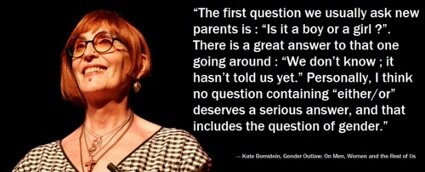 Though Gender Outlaw (Bornstein 1994) is a little bit older I chose to review it as my first review for Fearless Press for two reasons. First, it is a canonical book in the field of trans issues. I often find myself recommending it to friends who know little to nothing about transgender politics. Bornstein is a revolutionary author who has done a tremendous amount to advance transgender visibility. Much of that visibility came directly from the publication of Gender Outlaw.
Though Gender Outlaw (Bornstein 1994) is a little bit older I chose to review it as my first review for Fearless Press for two reasons. First, it is a canonical book in the field of trans issues. I often find myself recommending it to friends who know little to nothing about transgender politics. Bornstein is a revolutionary author who has done a tremendous amount to advance transgender visibility. Much of that visibility came directly from the publication of Gender Outlaw.
The second reason I chose to review this book is because of its readability. Gender Outlaw reads as a guidebook, pick it up at any point and you will find pictures, catchy quotes, and short non-offensive antidotes. Gender Outlaw is quite humorous. It is a wonderful collection of information the lay reader might not have otherwise encountered. Gender Outlaw reads easily as a light-hearted encyclopedic entry about transgender issues. It is a perfect first read for someone wanting to know more about transpolitics.
Bornstein covers a lot of the major issues surrounding gender perception and identity politics. Bornstein touches on the ideas of labels and naming ones self, understanding sex and gender differences, how people perceive behavior, laws, and the scientific and medical privilege that make transisitioning very difficult for a large number of people. Bornstein touches ever so briefly on many of the issues that affect transpeople today. Gender Outlaw is a very good book to introduce potential allies to the issues that shape the lives of transpeople as they negotiate the lines that define gender.
The basic structure of Bornstein’s ideas are based on deconstructive theory, a field popularized by French philosopher Jacques Derrida. In Gender Outlaw Bornstein attempts to take apart the way western people see sex and gender classifications, arguing that they are not necessary and that activists should attack these very basic binary labels that we all have attached to us. Throughout the text, Bornstein continually asks, “what is a man?” and “what is a woman?” Bornstein is trying to bring her readers to a postmodern understanding of gender classifications. Bornstein coins the term ‘Gender Defender,’ defining it as someone who “… defends the status quo of the existing gender system …” She argues that people with rigid views of sex and gender roles, who continue to perpetuate this view as hostile to difference, are essentially reproducing patriarchy, male-privilege, and all things that go into gender inequality (Bornstein 1994.74).
With simple language and short attention span style Bornstein takes care to give her reader a little taste of many things that represent an uprising of a subculture that is unhappy with binary gender classification, a subculture that is fighting for a new way of understanding and accepting gender identity. Gender Outlaw is broken up into pictures, stories, theory, opinions, and quotes. The thing is strung together like a Burroughs cut-up. Gender outlaw is an excellent read for the novice gender theorists, for someone new to rethinking things like gender, and for confused or hesitant parents of transpeople. I strongly recommend Gender Outlaw as starting point, an introduction to all things trans.
Book Title: Gender Outlaw: On Men, Woman and the Rest of Us
Author: Kate Bornstein
Publisher: Routledge (1994)
245 pages
Originally posted January 11, 2011

No Responses to “Gender Outlaw: On Men, Woman and the Rest of Us”